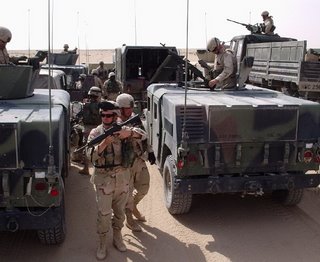About Iraqi war
(Source: BBC News)
Russia 'gave Iraq intelligence'
 Russia provided Saddam Hussein with intelligence on US military moves in the opening days of the US-led invasion in 2003, a Pentagon report has said.
Russia provided Saddam Hussein with intelligence on US military moves in the opening days of the US-led invasion in 2003, a Pentagon report has said.
 Russia provided Saddam Hussein with intelligence on US military moves in the opening days of the US-led invasion in 2003, a Pentagon report has said.
Russia provided Saddam Hussein with intelligence on US military moves in the opening days of the US-led invasion in 2003, a Pentagon report has said. Russia passed the details through its Baghdad ambassador, the report said. Russia has not commented on the claim.
One piece of intelligence passed on was false, and in fact helped a key US deception effort, the report concluded.
The report also quoted an Iraqi memo which mentioned Russian "sources" at the US military headquarters in Qatar.
"The information that the Russians have collected from their sources inside the American Central Command in Doha is that the United States is convinced that occupying Iraqi cities are [sic] impossible," said the Iraqi document, quoted by the Pentagon report.
One piece of intelligence passed on was false, and in fact helped a key US deception effort, the report concluded.
The report also quoted an Iraqi memo which mentioned Russian "sources" at the US military headquarters in Qatar.
"The information that the Russians have collected from their sources inside the American Central Command in Doha is that the United States is convinced that occupying Iraqi cities are [sic] impossible," said the Iraqi document, quoted by the Pentagon report.
Surprise attack
The false intelligence apparently passed on by Russia concerned the date the US was likely to start its main attack on Baghdad.
A document from the Iraqi foreign minister to Saddam Hussein, dated 2 April 2003, and quoting Russian intelligence, said the attack would not begin until the Army's 4th Infantry Division arrived about 15 April.
This reinforced an impression that the US military were trying to create, in order to catch Iraqis by surprise with an earlier attack, the Pentagon report said.
Troop movements towards Baghdad were passed on, the US says
In fact, the assault on the Iraqi capital began well before the 4th Division arrived, and the city fell about a week before 15 April.
The same Iraqi memo said that US troops were moving to cut off Baghdad from the south, east and north.
"Significantly, the (Iraqi) regime was also receiving intelligence from the Russians that fed suspicions that the attack out of Kuwait was merely a diversion," the report said.
The Pentagon report noted that there were Russian business interests in Iraqi oil, and a senior US military spokesman said Russia's actions were being seen as "driven by economic interests".
Saddam 'interference'
The report also said Saddam Hussein's inept military leadership was a key factor in the defeat of his forces.
"The largest contributing factor to the complete defeat of Iraq's military forces was the continued interference by Saddam (Hussein)," it said.
The BBC's Pentagon correspondent, Adam Brookes, says that overall the report portrays Saddam Hussein as chronically out of touch with reality - preoccupied with the prevention of domestic unrest and with the threat posed by Iran.
The 210-page report - Iraqi Perspectives Project - aims to help US officials understand in hindsight how the Iraqi military prepared for and fought during the invasion.
There are both classified and unclassified versions of the report.
The report also said Saddam Hussein's inept military leadership was a key factor in the defeat of his forces.
"The largest contributing factor to the complete defeat of Iraq's military forces was the continued interference by Saddam (Hussein)," it said.
The BBC's Pentagon correspondent, Adam Brookes, says that overall the report portrays Saddam Hussein as chronically out of touch with reality - preoccupied with the prevention of domestic unrest and with the threat posed by Iran.
The 210-page report - Iraqi Perspectives Project - aims to help US officials understand in hindsight how the Iraqi military prepared for and fought during the invasion.
There are both classified and unclassified versions of the report.
------------------------------------------------------------------
(Source: Daily Telegraph)
Saddam 'did not plan' insurgency
From correspondents in Washington
March 14, 2006
From correspondents in Washington
March 14, 2006

OUSTED Iraqi president Saddam Hussein did not plan the insurgency in Iraq because he thought the US would never invade the country, a US military history has concluded.
Even with US armored columns 161km from Baghdad about to make their final push, Saddam apparently believed the war was going Iraq's way, according to the history, called The Iraqi Perspectives Project.
"As far as can be determined from the interviews and records reviewed so far, there were no national plans to embark on a guerrilla war in the event of military defeat," it said.
"Nor did the regime appear to cobble together such plans as its world crumbled around it," it said.
"Buoyed by his earlier conviction that the Americans would never dare enter Baghdad, Saddam hoped to the very last minute that he could stay in power," it said.
Excerpts of the partially de-classified study for the US Joint Forces Command are being published in the May/June edition of Foreign Affairs, the journal of the Council on Foreign Relations. The study was written by Kevin Woods, James Lacey and Williamson Murray.
The history, an attempt to reconstruct the war from the Iraqi perspective, drew on interviews with dozens of captured senior Iraqi leaders and politicians and hundreds of thousands of official Iraqi documents.
It concluded, as others have, that Saddam Hussein had no weapons of mass destruction, but that he maintained ambiguity on the issue for fear that otherwise Israel might be encouraged to attack Iraq.
In late 2002, Saddam tilted toward trying to persuade the international community that Iraq had no weapons of mass destruction.
"But after years of purposeful obfuscation, it was difficult to convince anyone that Iraq was not once again being economical with the truth," the study said.
Saddam was convinced that France and Russia would prevent an invasion of Iraq to protect their economic interests, the study said, citing former Prime Minister Tareq Aziz.
Ibrahim Ahmad Abd al-Sattar, the Iraqi army and armed forces chief of staff, claimed that Saddam believed that even if the US did launch a ground invasion, Washington would rapidly bow to international pressure to halt the war, the study said.
When the invasion did come, Saddam clung to the belief that it would end short of regime change, as the 1991 Gulf War had, it said.
"No Iraqi leaders had believed coalition forces would ever reach Baghdad," Mr Sattar was quoted as saying.
------------------------------------------------------------------

0 Comments:
Post a Comment
<< Home